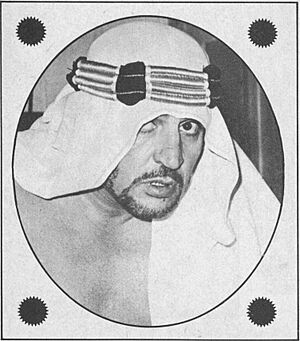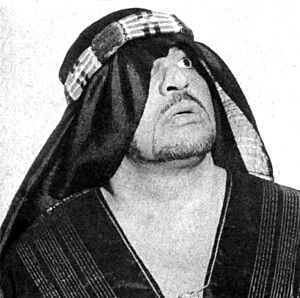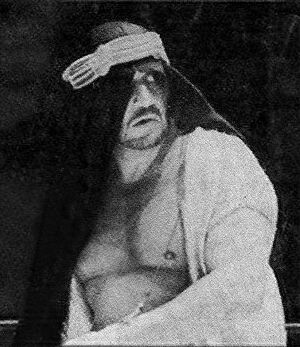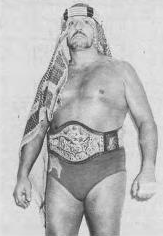The Sheik (wrestler) facts for kids
Quick facts for kids The Sheik |
|
|---|---|

Farhat, circa 1973
|
|
| Birth name | Edward George Farhat |
| Born | June 7, 1926 Lansing, Michigan, U.S. |
| Died | January 18, 2003 (aged 76) Williamston, Michigan, U.S. |
| Cause of death | Heart failure |
| Family | Sabu (nephew) |
| Professional wrestling career | |
| Ring name(s) | Eddie Farhat The Arabian Sheik The Original Sheik The Sheik The Sheik of Araby |
| Billed height | 5 ft 11 in (180 cm) |
| Billed weight | 250 lb (113 kg) |
| Billed from | "The Syrian Desert" |
| Debut | 1947 |
| Retired | May 5, 1995 (final match) December 11, 1998 (retirement ceremony) |
| Military service | |
| Allegiance | |
| Service/ |
United States Army |
| Years of service | 1944–1946 |
| Battles/wars | World War II |
Edward George Farhat (born June 7, 1926 – died January 18, 2003) was an American professional wrestler. He was famous by his ring name The Sheik. People often called him The Original Sheik to tell him apart from The Iron Sheik.
Farhat is known for helping to create the hardcore style in wrestling. Besides wrestling, he also ran a wrestling company called Big Time Wrestling. This company held shows in Detroit until the 1980s. He also helped plan matches for shows in Toronto from 1971 to 1977.
The Sheik was the uncle and trainer of Extreme Championship Wrestling star Sabu.
Contents
Edward Farhat's Early Life
Edward George Farhat was born on June 7, 1926. His family was Lebanese and lived in Lansing, Michigan. He was one of eleven children. Edward left school in the eighth grade. He worked many small jobs during the Great Depression.
During World War II, Edward joined the United States Army. He served from 1944 to 1946. He was honorably discharged after 18 months. Even though he played an Arab Muslim character in wrestling, Farhat was actually a Maronite Catholic.
The Sheik's Wrestling Career
Becoming The Sheik (1947–1965)
After serving in the U.S. Army, Farhat had his first professional wrestling match in January 1947. He wrestled as "Eddie Farhat." A few years later, he created his famous "Sheik" character. This character made him famous around the world.
He first wrestled as The Sheik of Araby in Chicago. His character was a rich prince from the Middle East. As the Sheik of Araby, he teamed up with Gypsy Joe. They won the NWA Midwestern Tag Team Championship in 1954.
The Sheik later faced NWA World Heavyweight Champion Lou Thesz. During this match, The Sheik left the ring and hid under a bus. This event was talked about a lot in the news. It helped make The Sheik character even more popular.
By the early 1960s, The Sheik's character was a wild Arab man from Syria. He wore a keffiyeh (a traditional headscarf). Before each match, he would kneel on a prayer rug. He would pretend to pray. He often used illegal moves. He would use hidden objects to gain an unfair advantage. Sometimes, his opponents would get his hidden object. The Sheik also threw fireballs at his opponents. He used lighter fluid on paper, lit quickly with a hidden lighter.
The Sheik did not speak much on camera. He would make sounds or speak in fake Arabic. His wife, Joyce, sometimes played his valet Princess Saleema. She would burn incense in the ring. He had different managers who spoke for him.
Wrestling in the WWWF (1965–1972)
In 1965, The Sheik returned to New York City. He wrestled for the World Wide Wrestling Federation (WWWF). He had big matches against WWWF World Heavyweight champion Bruno Sammartino. They wrestled three times at Madison Square Garden in 1968.
The Sheik had his last WWWF match on November 18, 1972. He lost to WWWF Champion Pedro Morales in Boston.
Famous Rivalries and International Tours
The Sheik had a long-running rivalry with Bobo Brazil. This feud started in The Sheik's own Big Time Wrestling company in Detroit. They often sold out Cobo Hall fighting over The Sheik's United States Championship. Their rivalry was even shown in a wrestling movie. They also wrestled in Memphis, Tennessee, and Los Angeles, California. In Los Angeles, he also had a big rivalry with Fred Blassie.
In 1967, while wrestling in Texas, a fan tried to attack The Sheik. Luckily, the attack was stopped.
Starting in 1969, The Sheik wrestled often in Toronto, Ontario, Canada. He was undefeated for 127 matches at Maple Leaf Gardens. He beat many famous wrestlers, including André the Giant in 1974. André ended The Sheik's winning streak in Toronto. The Sheik also helped plan the matches for the Toronto wrestling shows.
In 1972, The Sheik went to Japan for the first time. He wrestled for the Japan Pro Wrestling Alliance (JWA). When that company closed, he went to Giant Baba's All Japan Pro Wrestling (AJPW). He later wrestled for Antonio Inoki's New Japan Pro-Wrestling. He returned to AJPW in 1977. There, he teamed up with and then fought Abdullah the Butcher. Their match against Dory Funk Jr. and Terry Funk helped make the Funks popular in Japan.
The Sheik's rivalry with Abdullah the Butcher also came to the United States. A match between them in Birmingham, Alabama, was so wild that it stopped traffic. Police had to break it up.
Later Career and Retirement (1980–1998)
In 1980, The Sheik's Big Time Wrestling company in Detroit closed. He then wrestled for different independent groups in the U.S. and other countries.
From 1991 to 1995, he wrestled mostly in Japan with his nephew Sabu. They were with Frontier Martial-Arts Wrestling (FMW). FMW used the hardcore wrestling style that The Sheik helped create. He was in very dangerous matches there. On May 6, 1992, The Sheik wrestled in a Fire Death Match. The ring ropes were replaced with flaming barbed wire. During this match, Sheik suffered serious injuries and was in a coma.
In 1994, he had a short time in Eastern Championship Wrestling (ECW). His last match was on May 5, 1995. He defeated Damián 666 in front of many fans. After this match, he had his first heart attack.
When Sabu joined World Championship Wrestling (WCW) in 1995, The Sheik went with him as his manager. During a match, The Sheik's leg was broken. This made him leave wrestling for good. On December 11, 1998, a retirement ceremony was held for The Sheik in Japan. He officially retired from wrestling at age 72.
The Sheik's Death
Edward Farhat died from heart failure on January 18, 2003. He was in a hospital near his Williamston, Michigan, home. He was 76 years old. He was working on writing his life story when he passed away. He is buried at Mount Calvary Catholic Cemetery in Williamston.
The Sheik's Legacy
The Sheik was one of professional wrestling's biggest stars. He is now seen as a pioneer of hardcore wrestling. This style became very popular in the 1990s. On March 31, 2007, The Sheik was added to the WWE Hall of Fame. His nephew, Sabu, and Rob Van Dam (who he trained) inducted him. He also trained other wrestlers like Scott Steiner. He and Freddie Blassie even trained boxer Muhammad Ali for his famous 1976 match against Antonio Inoki.
As a wrestling promoter, Farhat was known for helping friends. For example, after Harley Race's wife died, The Sheik sent him money every week for a year.
His wife, Joyce, who was also his valet, died on November 27, 2013. She is buried with her husband. The Sheik's son Tom died in 2020 from kidney cancer. His oldest son, Ed Farhat Jr., who wrestled as "Captain Ed George," died in 2021 from COVID-19.
In his later years, Farhat gave many interviews for a book about his life. These interviews showed a lot about his career and character. He used to keep his wrestling character a secret. He would not answer calls for "Ed," saying "no Ed lives here." After he died, the interviews were kept private. A book about his life, called Blood and Fire, was released in 2022. It won an award for Best Pro Wrestling Book.
Championships and Awards
- 50th State Big Time Wrestling
- NWA Hawaii Heavyweight Championship (1 time)
- All Japan Pro Wrestling
- World's Strongest Tag Determination League Outstanding Performance Award (1978) – with Abdullah the Butcher & Tor Kamata
- Big Time Wrestling
- NWA United States Heavyweight Championship (Detroit version) (12 times)
- Buffalo Athletic Club
- NWA Midwestern Tag Team Championship (1 time) – with Gypsy Joe
- NWA World Tag Team Championship (Buffalo Athletic Club version) (1 time) – with Gypsy Joe
- Cauliflower Alley Club
- Other honoree (1995)
- Frontier Martial-Arts Wrestling
- WWA World Martial Arts Heavyweight Championship (1 time)
- United States Championship (1 time, first ever)
- Great Lakes Wrestling Association
- GLWA United States Heavyweight Championship (1 time)
- International Championship Wrestling
- ICW United States Heavyweight Championship (2 times, first ever)
- International Wrestling Enterprise (El Paso)
- International City Tag Team Championship (1 time) – with Ali Bey
- International Wrestling Association (Montreal)
- IWA International Heavyweight Championship (3 times)
- Japan Pro Wrestling Alliance
- NWA United National Championship (1 time)
- Maple Leaf Wrestling
- NWA United States Heavyweight Championship (Toronto version) (4 times)
- National Wrestling Alliance
- NWA Hall of Fame (Class of 2010)
- NWA Hollywood Wrestling
- NWA Americas Heavyweight Championship (2 times)
- Ohio Professional Wrestling Hall of Fame
- Class of 2022
- Pro Wrestling Illustrated
- PWI Most Hated Wrestler of the Year (1972)
- PWI ranked him #368 of the top 500 singles wrestlers of the "PWI Years" in 2003
- Professional Wrestling Hall of Fame and Museum
- Class of 2011
- Tri-State Wrestling Alliance
- NWA United States Heavyweight Championship (Detroit splinter version) (1 time, first ever)
- Western States Sports
- NWA North American Heavyweight Championship (Amarillo version) (1 time)
- World Class Championship Wrestling
- NWA Brass Knuckles Championship (Texas version) (1 time)
- NWA Texas Heavyweight Championship (1 time)
- World Wide Wrestling Federation/World Wrestling Entertainment
- WWWF United States Heavyweight Championship (2 times)
- WWE Hall of Fame (Class of 2007)
- Wrestling Observer Newsletter
- Wrestling Observer Newsletter Hall of Fame (Class of 1996)
- Other championships
- BTW United States Heavyweight Championship (1 time)
- Midwest Heavyweight Championship (1 time)
- Southern Heavyweight Championship (Louisiana/Mississippi version) (1 time)
See Also
- Big Time Wrestling
 | Chris Smalls |
 | Fred Hampton |
 | Ralph Abernathy |




